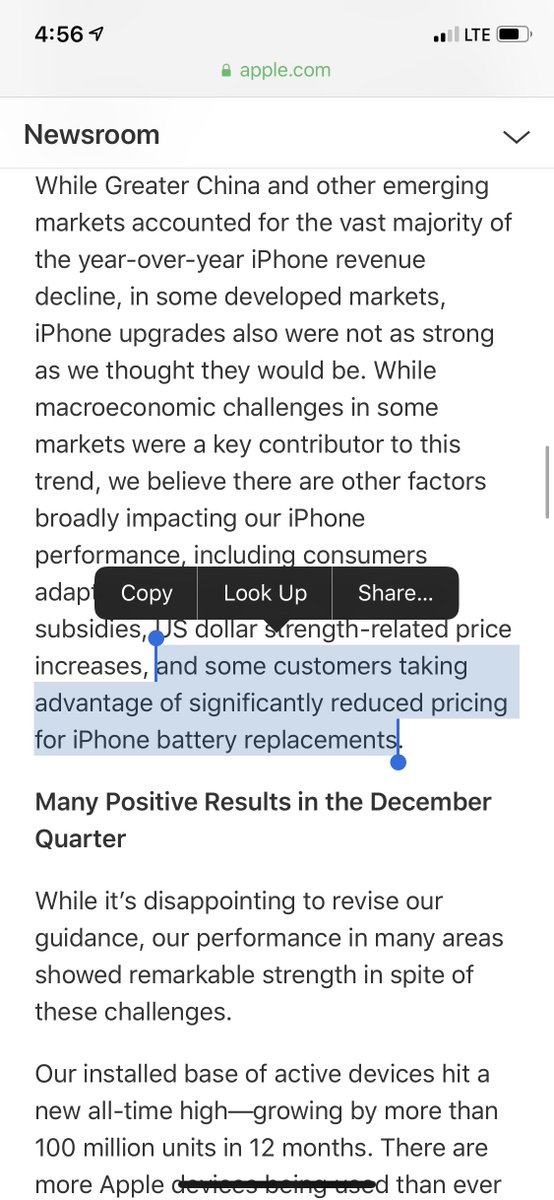Everything
Is Plunging: Stocks, Yields, Dollar Tumble As ISM, Apple Panic
Spreads

3
January, 2019
it
did not take long for the market to flush today, when after a
tentative drop following last night's AAPL revenue guidance cut and
the FX multi-flash crash, stocks took lows with the Dow plunging over
650 points this morning following the abysmal ISM Manufacturing
report which showed that US mfg sentiment in December tumbled the
most since October 2008.
Today's
drop has pushed the Dow to below the Dec 26 closing level, which
preceded the historic 1000 point Dow move on December 27. Come to
think of it, we are about 350 points from another 4-digit move in the
Dow Jones, only this time to the downside.
While
the S&P 500 fell more than 2%, today's broad-based drop is being
led by the Nasdaq, which is down over 3%, largely due to the Apple
fiasco, which dragged the stock more than 10% lower, its biggest drop
in over 5 years.
Other
notable decliners include (per Bloomberg):
- All 30 chipmakers in the Philadelphia Semi index fell, with Qorvo, Skyworks and Broadcom off at least 4.5 percent.
- 3M, Caterpillar and DowDuPont dropped at least 3 percent.
- Bristol-Myers plunged 12 percent, while Celgene jumped 28 percent.
- Carmakers reported monthly sales; GM and Ford both retreated.
- Airlines tumbled after Delta cut its revenue forecast. American was off 9.5 percent.
“That
Tim Cook and his company mentioned China as the reason behind the
downturn in the company’s outlook seemed to hit exactly the
pressure point traders and investors were already alarmed over,”
Greg McKenna, markets strategist at McKenna Macro wrote in a client
note. "That is, the China and global slowdown which seems to
have been confirmed by Wednesday’s global manufacturing PMI data"
and Thursday's US ISm report.
A
modest boost to stocks from Bristol-Myers' bid to buy Celgene and a
strong ADP print quickly faded after the dismal ISM report hit at
10am.
Stocks
weren't the only thing in freefall: so are Treasury yields led by the
belly, with the 10Y tumbling below 2.60%, and down the 2.57% last,
the lowest level since January 2018. In fact, today's sharp move can
best be compared to a car crash, if only for the TSY shorts.
Meanwhile,
the 1Y yield is just 2bps away from surpassing the yield on the 10Y
in today's curve inversion watch.
Finally,
with US recession fears front and center, the US Dollar is also
tumbling while gold is surging.
And
with everything going to hell in a hand basket, gold is just waiting
for the right moment to pounce
Stock
market indexes
Dow Jones Crashes 600 Points After Apple Issues Gloomy
Sales Forecast
3
January, 2019
On
Wednesday, Apple Chairman Tim Cook said in a letter to investors that
an economic slump in China, plus US trade tensions, have resulted in
a drop in iPhone sales, forcing the company to downgrade earnings
forecasts for the first quarter of 2019.
Battered
by negative Apple news, US stock indices dropped sharply
on Thursday morning. The Dow Jones fell 650 points, around 2.8
per cent, while the S&P declined 500 points, shedding 2.4 per
cent of its value, and the NASDAQ retreated 2.8 per cent,
CNN reports.
This
represents the biggest stock market dive since 5 December when
US stocks suffered a dramatic decline; the Dow
Jones fell 800 points back then due
to renewed concerns over Washington's trade dispute
with China and indications of a possible looming economic
recession.
This
time, shortly after the decline, the Dow Jones regained points
and the net fall, as of the time of publication, currently
stands at 409 points.
On
2 January, Apple CEO Tim Cook noted that China’s economy slowed
in the second half of 2018 amid expectations that
rising trade tensions with the United States will continue
to impact the company's sales.
"While
we anticipated some challenges in key emerging markets, we did
not foresee the magnitude of the economic deceleration,
particularly in Greater China," Cook said on Wednesday.
"In fact, most of our revenue shortfall to our
guidance, and over 100 per cent of our year-over-year
worldwide revenue decline, occurred in Greater China
across iPhone, Mac and iPad."
Apple
now expects to achieve sales turnover of approximately $84
billion in the final quarter of 2018 (Q4), compared
with the company’s earlier revenue forecasts of between
$89 billion and $93 billion.
Although
non-phone categories, including the Mac, Apple Watch and iPad, grew
19 per cent worldwide, Cook noted that more than 100 per cent
of the company's fourth quarter year-over-year revenue decline
occurred due a drop in Chinese sales of iPhones and other
Apple product.
Other
factors adversely affecting Apple include a strong US dollar and an
economic slowdown in many emerging markets, Cook added.
After
sowing chaos in global markets - triggering a
flash crash in several AsiaPac currency pairs and
a broad-based selloff in Asian indexes - by cutting
its quarterly revenue guidance for
the first time in 16 years, Apple is watching its shares on Thursday
morning disintegrate, erasing a rally that briefly drove its market
capitalization near $1.1 trillion over the summer. In a move that
portends a disastrous open for US indexes, Apple
shares dropped 9.3% during premarket trading to $143.25, their lowest
level since July 2017. The
stock is now down 37% from its all time high of $232.07 hit on
October 3, and the rate of descent now approaching that of
cryptocurrencies

Apple
shares plummeted after CEO Tim Cook revealed that the iPhone maker
expects a drop of up to $9bn in revenue compared to its November
report. More affordable battery replacements are to blame, among
other things.
Apple
stated that it now expects a revenue of approximately $84 billion in
the first quarter of 2019, down from its previous estimate of $89bn
to $93bn. Markets have reacted swiftly to the news, sending Apple
shares into a 7.5-percent nosedive.
Explaining
the causes behind the revision, Cook almost squarely blamed the
expected drop in sales on the economic slowdown in mainland China, a
key emerging market for Apple smartphones.
"While
we anticipated some challenges in key emerging markets, we did not
foresee the magnitude of the economic deceleration, particularly in
Greater China," Cook wrote, noting that "most of our
revenue shortfall to our guidance, and over 100 percent of our
year-over-year worldwide revenue decline, occurred in Greater China."
By
far the greatest hit was dealt by iPhone sales, which, per Cook’s
admission, are responsible “for all our revenue shortfall to our
guidance and for much more than our entire year-over-year revenue
decline”
In
fact, non-iPhone product revenues actually contributed to 19-percent
growth, except in China, where, according to Cook, a cooling-down
economy hurt all kinds of Apple products (but still, the iPhone was
the worst by far).
The
ongoing US-China trade spat has also played its part in driving down
Apple sales in the country, Cook stated, citing "the climate of
mounting uncertainty" over the back-and-forth between Washington
and Beijing.
If
Apple racks up $84bn by the end of the first quarter, it will be a
decrease of more than $4bn from the same period last year, when it
pocketed $88.3bn.
Buried
deep in the letter is Cook's admission that some of the devoted Apple
fans who used to buy new devices every year are now "taking
advantage of significantly reduced pricing for iPhone battery
replacements."
Following
a massive scandal over its practice of deliberately slowing down
older iPhones, Apple reduced the price for its battery replacements,
charging $29 instead of $79 in 2018. The program was wrapped up by
the end of the year.
Twitter
has met Apple's troubles with derision, with many pointing out that
new models are massively overpriced while hardly being technological
breakthroughs.
See Wasim Yaqoob's other Tweets
One
user argued that Cook's mentioning of the battery drama serves as
proof that it was Apple's strategy from the beginning to fire up
sales by damaging the performance and battery life of older models.
Not sure Cook should have listed this as a reason for slower than expected iPhone sales. Sure makes it sound like the old way of handling battery degradation was intended to drive people to buy new phones.















No comments:
Post a Comment
Note: only a member of this blog may post a comment.